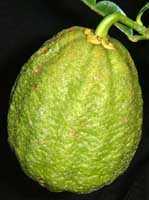Shangjuan
| Shangjuan, Ichang lemon | |
|---|---|
 | |
| Not a shangyuan but an Ichang papeda fruit, one of the parents of a shangyuan. | |
| Scientific classification | |
| Kingdom: | Plantae |
| (unranked): | Angiosperms |
| (unranked): | Eudicots |
| (unranked): | Rosids |
| Order: | Sapindales |
| Family: | Rutaceae |
| Genus: | Citrus |
| Species: | C. ichangensis × C. maxima |
| Binomial name | |
| Citrus ichangensis × Citrus maxima | |
The shangjuan, or Ichang lemon (Citrus ichangensis × C. maxima), is a cold hardy citrus fruit and plant originating in East Asia. According to some it is the best bet for cold-hardy citrus with edible fruit.[1] It is believed to be a hybrid of pomelo and Ichang papeda and thus may also be called Ichang pomelo[2].
Description
Shangjuan forms a shrub or small tree, which is commonly thorny. Leaves are notable for a large petiole, resembling those of the related Kaffir lime and Ichang papeda, and are fragrant. The large fruit has a flavor resembling a mixture of lemon and grapefruit, and is occasionally used as a substitute for those fruits. Like other citrus fruit with C. ichangensis ancestry, the shangjuan is relatively cold-tolerant.
The fruit looks a bit like a grapefruit, and can be either pale yellow or green depending on the degree of ripeness. Shangjuan fruits, which are very aromatic, can be as large as a grapefruit (up to 10 cm or larger).
